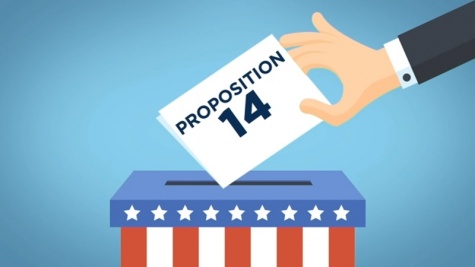
By Maxine Davey | Editor in Chief
October 23, 2020
For anyone turning 18 before November 3 (or anyone just hoping to understand what this year’s ballot is all about), here is a comprehensive guide to the 2020 California Propositions.
Prop 14: Stem cell research bonds
Authorizes $5.5 billion state bonds for stem cell and medical research.
PROS: Dedicates money towards cures for diseases such as cancer, Alzheimer’s, and diabetes. Supported by doctors and Nobel prize-winning scientists.
“Prop 14 would be incredibly beneficial because of its short and long term implications of helping those with mental illnesses as well as funding research in a developing field,” senior Cal Donnelly said.
CONS: $3 billion have already been spent with limited results; new bonds are unaffordable and unwise during current economic crisis.
Prop 15: Tax assessment changes
Commercial properties worth more than $3 million will have increased property taxes based on current market value instead of purchase price.
PROS: Closes loopholes for large corporations. Increased tax revenue will be used to benefit schools and communities.
CONS: Increases price of goods, services, and utilities.
Prop 16: Affirmative action
Reverses constitutional provision and allows race, sex, color, ethnicity, or national origin to affect government decision making.
PROS: May increase opportunities for minorities and women in employment and public positions.
CONS: Allows preferential treatment not based on merit, considered a “band-aid” on more widespread, deeper-rooted issues.
Prop 17: Voter rights
Restores voting rights to people after completing prison term. Allows voting during parole.
PROS: Studies show that criminals are less likely to commit crimes if their voting rights are restored after sentence completion.
CONS: Allows criminals to reintegrate without paying full debt to society; may deny victims justice.
“We don’t know where criminals are mentally…they could potentially be in a place of anger or frustration at the government,” junior Cora Lafollette said. “So they could be in a delicate state of mind, and there may be ulterior motives.”
Prop 18: Lowering voting age
Allows 17 year-olds to vote in primary elections if they will be 18 by the date of the general election.
PROS: Boosts civic participation, allows all voters to have a say in who will appear in general elections.
CONS: Voting age is 18 for a reason—ensures responsibility and accountability of voters.
Prop 19: Property taxes
Allows transfer of tax bases from one primary residence to another for seniors, disabled homeowners, and disaster victims.
PROS: Certain homeowners would be eligible for property tax savings, especially benefiting California wildfire victims.
CONS: Eliminates right to pass on home to family members without property tax raises.
Prop 20: Parole restrictions
Adds certain crimes to list of offenses with parole restrictions. Increased jail time or other penalties for theft-related charges.
PROS: Closes loopholes allowing some predatory criminals to be released early; expands DNA collection to help solve crimes.
CONS: Large increase in prison spending instead of allocating money to community issues or education.
Prop 21: Rent control
Expands city and county government control over rent rates.
PROS: Could potentially keep families in their homes and prevent homelessness.
CONS: Less incentive for builders to construct more housing (reduced profits), decreases revenue for local governments.
Prop 22: App-based drivers
App-based drivers (Uber, Lyft, etc.) will be considered “independent contractors” instead of “employees.”
PROS: Drivers can create their own hours with complete flexibility.
CONS: Drivers would not get benefits of standard employees; large companies could profit off exploitation.
Prop 23: Kidney dialysis clinics
Requires a doctor presence at kidney dialysis clinics at all times.
PROS: Improves staffing of clinics; applies advancements to all clinics, including disproportionately-affected minority communities.
CONS: Type of doctor unspecified, increased clinic costs could force closures.
Prop 24: Privacy laws
Expands data privacy laws and allows customers to set limits on sharing of personal information.
PROS: Protects online users from privacy invasions and spread of personal data.
CONS: Increases annual state costs.
Prop 25: Bail system
Replaces current money bail with system based on criminal risk and public safety.
PROS: Current system perpetuates wealth-based inequality, decreases county jail costs, and evaluates safety over money.
CONS: Computer profiling system to determine risk requires increased funds and may be discriminatory.


Leave a Reply